Attracting a new wave of talent to the Morgridge Institute
If there is a central premise behind Fearless Science — the aspirational theme we live by here at the Morgridge Institute — it would be to embrace the unknown
This year, we’ll be doing that in more ways than one.

Brad Schwartz
We will be seeing very significant changes to our scientific team. As you will read in our lead story, Jamie Thomson — the inaugural investigator at Morgridge and arguably Wisconsin’s most famous contemporary scientist — will be retiring this summer. As the researcher who put stem cell science on the map 23 years ago, Jamie embodies the kind of scientific discovery we strive for at Morgridge: Born from basic curiosity, capable of changing our fundamental understanding of biology, and replete with great societal benefit.
Jamie and his team have been a big part of our identity. We will be wise to aim for the same level of excellence and accomplishment as we search for new talent.
Along with Jamie’s pending departure, two other Morgridge investigators have recently taken new positions and a number of long-planned new hires are in the pipeline. All told, we will be hiring no fewer than six new investigators in the next two years. That’s a lot of change for an institute of our size. Those folks will have a major impact on our identity and our success moving forward.
So the question on our minds lately is: What do we want the Morgridge Institute to be in the future? Is this an opportunity to redefine ourselves, or forge entirely new research directions? Or do we lean more strongly into the traits we honor today, such as encouraging bold questions, taking advisable risks and following the science wherever it may lead us?
To answer that question, we have undertaken a comprehensive plan in 2021 involving the Morgridge Board of Trustees, the Morgridge Scientific Advisory Board, and most importantly, our scientists. In our interviews with investigators, the take-home message was unambiguous: Focus on the people, rather than any specific frontier in science. We should continue to focus on finding the best available scientific talent who also combine curiosity, creativity, collegiality, and a strong desire to work with and learn from others.
We recognize that to achieve this lofty goal of hiring the absolute best, we have to get the best people from all aspects of society, including those who have been traditionally underrepresented in science. So an integral part of our searching, recruitment and retention strategy will be to ensure that we are reaching the widest range of talent. We also want to ensure that we have a culture of excellence and inclusiveness and a place where people care for one another.
We are not going to make this process about accumulating prestige or status. We want not only the best possible scientist, but the person most likely to make major advances because they are here instead of somewhere else. That leads to a triple-win: A win for the new recruit, whose career will thrive; a win for the Morgridge community, as a place that offers fertile ground for discovery; and importantly, a win for the scientific enterprise, because we’re genuinely improving research, not just competing with other places.
This, after all, is what society expects of us
Sincerely,
Brad Schwartz
CEO, Morgridge Institute for Research
2021 Milestones
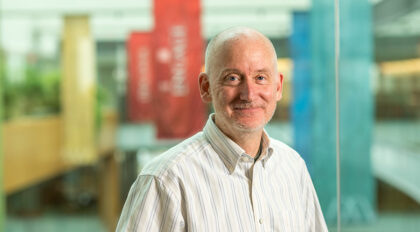
A science trailblazer retires: Stem cell researcher James Thomson’s legacy changed the future of biology
James Thomson helped the scientific world turn its attention to the remarkable stem cells that give rise to all of the building blocks of life. After more than 30 years with UW–Madison and 15 years with the Morgridge Institute, Thomson has announced plans to retire in July 2022.
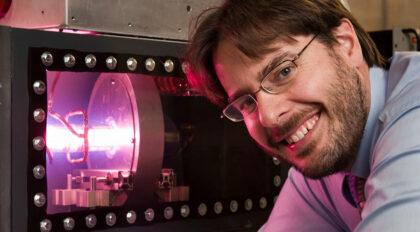
Time to SHINE: UW, Morgridge spinoff has great hopes for fusion’s future
SHINE, a spinoff company that spent its formative years at Morgridge, is helping usher in the fusion energy age with several technologies, including a safe way to create life-saving medical isotopes.
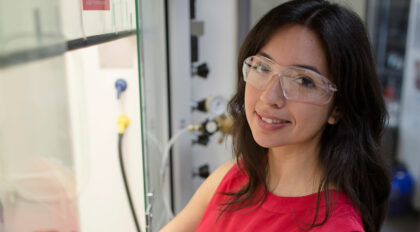
Morgridge, UW alum ‘diving into the deep end’ of vaccine development
After years of sharpening her knowledge of mass spectrometry in the Josh Coon Lab, chemistry PhD alumna Anji Trujillo landed her dream job of working on the front lines of drug development at Pfizer in St. Louis.
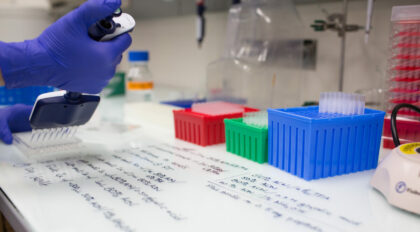
Where are they now? Catching up with recent alumni in their new careers
A few of our recent Morgridge alumni reflect on how their research experience at the institute prepared them for their scientific careers.
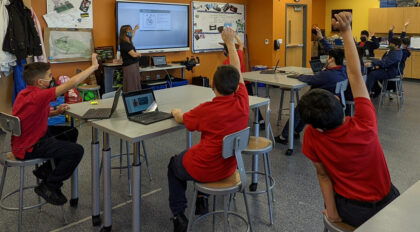
Giving middle school students a glimpse into the ‘invisible world’ of viruses
A new digital learning resource developed by PBS Wisconsin called “Meet the Lab,” which gives middle school-aged students a glimpse into high-powered research labs and the scientists who run them, highlights the Morgridge Institute virology research team.

Best of the Fest: 2021 Wisconsin Science Festival in photos
We’ve collected some of our favorite moments from “Science on the Square” during the 2021 Wisconsin Science Festival.

Resilience: How COVID-19 challenged the scientific world
In late 2019, a novel coronavirus began spreading across the globe. The pandemic still isn’t over, but it hasn’t stopped scientific progress. We spoke with scientists at the Morgridge Institute for Research and the University of Wisconsin–Madison who shared stories of promise, resilience, and lessons learned to come together, overcome challenges and work for the public good.
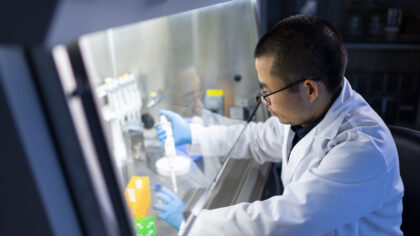
Imaging method predicts how well stem cells can differentiate into cardiac muscle cells
Morgridge researchers developed an imaging technique that can predict the efficiency of cardiac muscle cell differentiation from stem cells as a method of quality control for potential regenerative therapies.

Hunting viral variants across Wisconsin, powered by high-throughput computing
When dangerous COVID viral variants were sweeping the globe, David O'Connor was busy tracking their spread in Wisconsin. His secret weapon? High-throughput computing.

Wisconsin bioethics project chronicles pregnancy, substance use disorder and the law
A 50-state analysis of laws related to substance use and pregnancy will be a critical first step in helping medical leaders assess the impact of the widespread opioid epidemic.
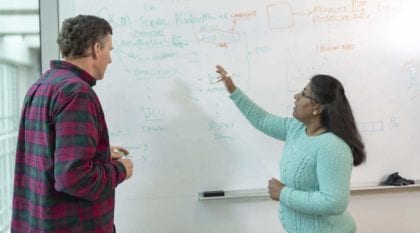
Raja awarded the “Women Scientist Award” for achievements in bioinformatics
Postdoctoral researcher Kalpana Raja received the "Women Scientist Award" from the Society for Bioinformatics and Biological Sciences for her scientific merits.
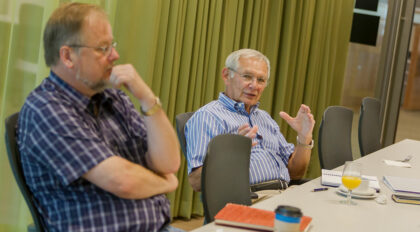
Honoring Ernie Micek: ‘always doing the right thing’
Ernest 'Ernie' Micek was a global trade leader and entrepreneur who brought decades of experience to help the Morgridge Institute by 'always doing the right thing.'
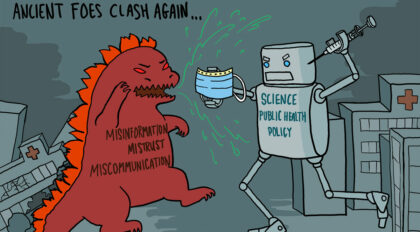
Top prizes in ethics cartooning contest address COVID-19 and more
Five prizes were awarded in the fourth annual Ethics Cartooning Competition, addressing the social impacts of scientific research, like issues on public health and communication during the COVID-19 pandemic.

The (cell) medium is the message: A new tool for studying cell biology in a dish
Morgridge investigator Jason Cantor is partnering with Thermo Fisher Scientific to give biologists a new medium to study human cells in their most natural state.
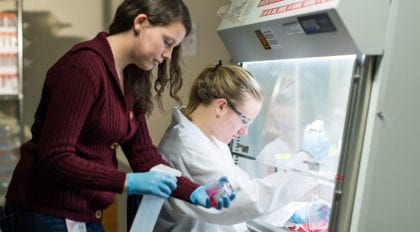
Imaging technique sheds light on a notoriously slow-growing cancer
Neuroendocrine cancers grow so slowly they often evade detection before it's too late. By mimicking that slow growth in the lab, the Melissa Skala Lab hopes to speed up the creation of more effective treatments.
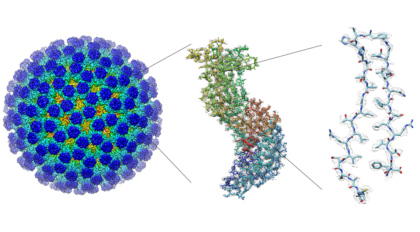
Morgridge scientists collaborate with Genentech to soup up Cryo-EM imaging
A partnership with Genentech is helping Morgridge Investigator Tim Grant improve software that helps scientists harness the incredible power of cryo-EM microscopes for drug discovery.
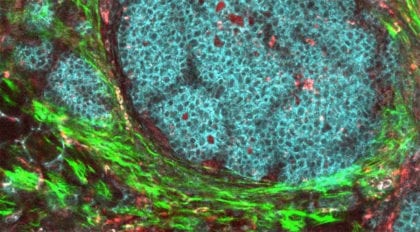
Building a better bioimaging community: Chan Zuckerberg Initiative supports international partnership
Investigator Kevin Eliceiri leads a grant with BioImaging North America, which was recently awarded $1.2 million in funding from the Chan Zuckerberg Initiative.
